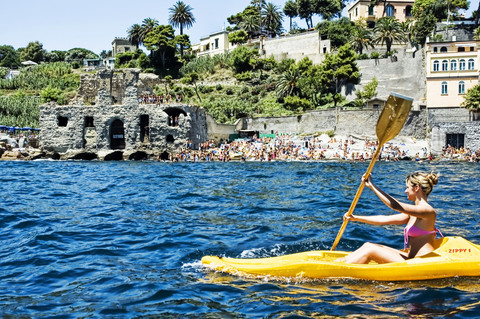
Across Europe, empty airports, deserted squares and lonely monuments illustrate how the coronavirus outbreak has prompted probably the worst crisis in history for the bloc’s travel and tourism industry.
It is estimated that between €275bn to €400bn will be lost for the tourism and travel sector because of the pandemic, the commissioner of the internal market, Thierry Breton, told MEPs from the parliament’s committee on tourism on Tuesday (21 April).
More than half of the EU’s businesses in the tourism sector are located in Italy, Spain, France and Germany – followed by Greece, Portugal and Poland.
And tourism is an essential player in the EU’s economy. In 2018, the sector directly contributed 3.9 percent to EU GDP and accounted for 5.1 percent of the total labour force – about 11.9m jobs.
“Tourism was the first sector to be hit by the coronavirus and I am sure that it will be the slowest to recover and come out of this phase,” Breton told MEPs.
EU leaders will meet once again in a special online summit on Thursday to discuss how to mitigate the economic impact of the coronavirus pandemic.
The EU will need “massive funds” for the recovery, said commissioner Breton, who claimed that tourism should stand first in line.
“I will be fighting to make sure tourism will be the biggest beneficiary of this (recovery plan) – with around 20 (to) 25 percent,” he said, adding that all member states should be able to equally access these funds.
Additionally, Breton claimed that there is an opportunity to take advantage of the current crisis to reinvent “the tourism of tomorrow – towards a more sustainable, resilient and innovative sector”.
A special summit could be organised in September or October to deal with the future of the sector, Breton added.
Pandemic summer
Meanwhile, there is still very little official information – but lots of speculation – on how the summer holidays will look in Europe – especially since the coronavirus might surge back when measures are eased, as it is now happening in some Asian countries.
In Belgium, local authorities along the coast are calling on the federal government to implement some guidelines, after one municipality proposed last week regulating access to the beach with special passes.
Similarly, Portuguese prime minister Antonio Costa said last week that beach restrictions will be put in place to avoid overcrowded spaces.
Austria, meanwhile, wants to have bilateral agreements with countries such as Germany to allow tourists to enter the country during the summer.
But Spain has said the country will not resume tourist activity until “it is extraordinarily safe”.
Contradictory messages?
The commission president Ursula von der Leyen said in an interview with Portuguese media last Sunday (19 April) that Europe will find “smart solutions” that will enable summer vacations.
However, she advised Europeans earlier this month not to rush to book their summer holidays, as there are no reliable forecasts about the pandemic for July and August.
MEPs from the tourism committee urged the European Commission not to send “contradictory messages” to the industry and offer as much certainty as possible for the summer.
A commission spokesperson said on Tuesday that the EU’s executive body is considering “smart solutions for the summer season” which enable a coordinated EU approach that has a sense for everyone while taking into consideration local disparities.
Meanwhile, the commission is also preparing guidelines for member states on how to restore ordinary travel within the Schengen area – although the reopening of borders will depend on the health situation of each member state, according to Breton.
“We will do our utmost to make sure we are as harmonised as possible in trying to allow controlled movement and travel while meeting obligations and measures,” he said.
The commission invited all Schengen member countries and Schengen associated states to prolong the external border closure for nonessential travel into the EU until 15 May.
However, French president Emmanuel Macron has suggested that the EU stayed closed until September at least.
